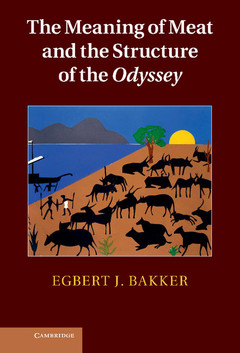Description
The Meaning of Meat and the Structure of the Odyssey
Author: Bakker Egbert J.
A literary study of the Odyssey based on the central economic and symbolic importance of the eating of meat.
Language: English
Subject for The Meaning of Meat and the Structure of the Odyssey:
Approximative price 96.55 €
In Print (Delivery period: 14 days).
Add to cart
The Meaning of Meat and the Structure of the Odyssey
Publication date: 04-2013
Support: Print on demand
Publication date: 04-2013
Support: Print on demand
Approximative price 36.76 €
In Print (Delivery period: 14 days).
Add to cart
The Meaning of Meat and the Structure of the Odyssey
Publication date: 06-2016
Support: Print on demand
Publication date: 06-2016
Support: Print on demand
Description
/li>Contents
/li>Biography
/li>
This comprehensive study of the Odyssey sees in meat and meat consumption a centre of gravitation for the interpretation of the poem. It aims to place the cultural practices represented in the poem against the background of the (agricultural) lived reality of the poem's audiences in the archaic age, and to align the themes of the adventures in Odysseus' wanderings with the events that transpire at Ithaca in the hero's absence. The criminal meat consumption of the suitors of Penelope in the civilised space of Ithaca is shown to resonate with the adventures of Odysseus and his companions in the pre-cultural worlds they are forced to visit. The book draws on folklore studies, the anthropology of hunting cultures, the comparative study of oral traditions, and the agricultural history of archaic and classical Greece. It will also be of interest to narratologists and students of folklore and Homeric poetics.
Prologue: food for song; 1. Epos and aoidê; 2. Nostos as quest; 3. Meat in myth and life; 4. Unlimited goats and counted sheep; 5. Feasting in the land of the dawn; 6. The revenge of the sun; 7. The justice of Poseidon; 8. Remembering the gastêr; Epilogue: on 'interformularity'.
Egbert J. Bakker is Professor of Classics at Yale University, Connecticut. Within the wider area of the interaction between linguistic analysis and literary interpretation he works mainly on the language, poetics and interpretation of the Homeric poems. He has lectured and published widely on both linguistic and literary subjects. Among his publications are Linguistics and Formulas in Homer (1988), Poetry in Speech: Orality and Homeric Discourse (1997) and Pointing at the Past: From Formula to Performance in Homeric Poetics (2005). He has co-edited Brill's Companion to Herodotus (2002) and is the editor of A Companion to the Ancient Greek Language (2010).
© 2024 LAVOISIER S.A.S.
These books may interest you

People and Themes in Homer's Odyssey 129.87 €



